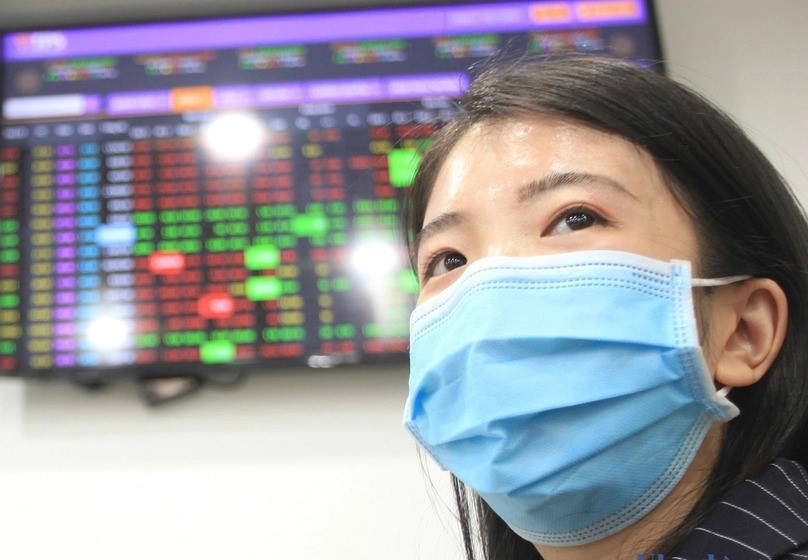Prospects of investment channels in 2023
Vietnam's economy is forecast to continue facing a range of difficulties in 2023, when up to one third of the world's economies may fall into recession and global GDP is expected to grow only 2.2-2.5%, says Can Van Luc, director of BIDV Research & Training Institute.
What investors need to do now is carefully select suitable investment channels they view as profitable amid economic difficulties in Vietnam and the world.
Bank deposits
In the context of economic instability, safe investment channels like bank deposits should be considered and prioritized.
In the first and second quarters of 2022, deposit interest rates remained low to support the reduction of lending rates, helping to accelerate the economic recovery. As a result, deposits at credit institutions grew slowly, reaching 5.5% by the end of November, only half of the credit growth of 12.2%. Therefore, to ensure liquidity, commercial banks increased deposit rates. At the end of November, the deposit interest rates at some banks were up to 9-10% per year for 12-month terms, compared to 5.4-6.8% in 2021.
By the end of December, the average interest rate for 12-month deposits at four state-owned banks for individual customers stood at 7.4%, up 1.83 percentage points from the year-beginning; while the figure for organizations was 6.4%, an increase of 1.43 percentage points, according to BIDV Training & Research Institute data.
Since these interest rate increases were made from the third quarter of 2022, they did not have much impact on depositors' savings for the whole of 2022. Therefore, depositors’ return after inflation in 2022 was about 4-5%.
The U.S Federal Reserve (Fed) is forecast to continue to raise interest rates until the end of the first quarter of 2023, thereby affecting interest rates in Vietnam for the whole year. Inflation, interest and exchange rate pressures still exist, making deposit interest rates likely to remain high in 2023. This will benefit investors, but also may affect capital flows into other investment channels, reducing liquidity and causing a downward spiral in the stock, bond and real estate channels.

Vietnam's stock market is one of the world's strongest falling markets in 2022. Photo by The Investor/Trong Hieu.
Stock market
In 2022, the Vietnamese stock market entered a phase of correction after experiencing a prolonged uptrend. As of December 15, the VN-Index, which represents the Ho Chi Minh Stock Exchange (HoSE), had plunged nearly 30% from about 1,500 points to 1,050.28. The market’s liquidity decreased significantly, with average trading value on the HoSE in November dropping to VND11.4 trillion ($486.14 million) per session, down 42% from the end of 2021.
In general, the prospects for Vietnam's stock market remains positive, as the country’s GDP growth in 2023 is forecast to remain high compared to the rest of the world, and inflation will continue to be controled. This correction also made the valuation of stocks in the market attractive to investors, especially long-term ones. The P/E (price to earning ratio) of the VN-Index in November decreased by about 10 times, like what recorded in 2008 and 2012.
The positive outlook for the Vietnamese stock market is also reflected by foreign investors’ total transaction value of more than VND64 trillion ($2.73 billion) on the HoSE, an increase of 5% from December 2021.
The most important thing is that more than VND15 trillion ($639.66 million) shares were purchased in November, with net buyers picking up nearly VND12 trillion compared to net sellers with a value of VND3.2 trillion ($136.36 million) at the end of October.
The handling of violations such as stock manipulation has helped the market become healthier. As a result, the current securities market may be suitable for long-term investors who can accept higher risks. It is likely that the VN-Index will expand by about 10-15% in 2023.
Bond market
By the end of November, the State Treasury had issued a total of VND182.22 trillion ($7.77 billion) of government bonds, equivalent to 46% of the original 2022 plan of VND400 trillion, and 85% of the adjusted plan of VND215 trillion.
According to the Vietnam Bond Association (VBMA), the total corporate bond issuance value in the first 11 months of 2022 reached about VND336 trillion ($14.33 billion), down more than 57% compared to the same period in 2021. Of this, public offerings plummeted 60% while private placements decreased by 56%.
In addition, many businesses actively bought back issued bonds, with a total value of about VND163 trillion ($6.95 billion), up 32% year-on-year. Especially, after the case of Van Thinh Phat, bond redemption increased sharply. Meanwhile, those who had bought Van Thinh Phat member companies’ bonds faced difficulties in recovering their capital. This showed a significant risk in the corporate bond investment channel.
The issuance of Decree 65/2022/ND-CP on private placement of corporate bonds has partly helped the market become safer and more sustainable, but a more appropriate roadmap is needed. In addition, in 2022, regulators strictly handled violations related to corporate bond issuances such as the cases of Tan Hoang Minh and Van Thinh Phat, thereby helping the market develop sustainably in the long run.
However, because Decree 65 has tightened the private placement of corporate bonds, while public offering costs take time and effort, corporate bond issuances declined sharply, with only VND10 trillion ($426 million) in October and November, compared to VND326 trillion in the first nine months. Besides, stricter regulations on professional securities investors have reduced the number of individual investors who can buy corporate bonds.
In order to remove the difficulties facing the market, it is expected that Decree 65 will be revised in a more open direction, thus facilitating a recovery in the next 1-2 years. However, this is still a high-risk market that is not suitable for amateur individual investors.
At present, the corporate bond investment channel is suitable for investors who have knowledge of financial markets and are able to analyze the operational status of enterprises.
Real estate market
In 2022, real estate continued to attract investors’ interest. In the first six months of the year, Vietnam's real estate market was relatively positive, showing a strong recovery after the pandemic. However, from the third quarter, the market showed signs of slowing down, mainly due to limited access to capital. In addition, the arrests of leaders of major groups Tan Hoang Minh and Van Thinh Phat affected investors' confidence and some "fundamental" issues such as scarce supply, supply-demand imbalance, and high prices.
According to the Ministry of Construction, at the end of the third quarter of 2022, apartment prices showed signs of increasing with apartments priced below VND25 million ($1,066) per sq.m in areas near downtown Hanoi and Ho Chi Minh City, while housing and land prices started to fall.
According to statistics from Batdongsan.com.vn, the nine-month average rental rate of townhouses rose 3% per year in Hanoi and 2.9% in Ho Chi Minh City.
Experts said that the market’s current difficulties stem from a crisis of confidence following the arrests of the leaders of Tan Hoang Minh, FLC, and Van Thinh Phat. In addition, high real estate prices and limited access to credit slowed real estate transactions from the third quarter of 2022.
However, with a relatively positive economic development outlook and the drastic handling of violations by competent agencies, the property market is expected to recover from the third or fourth quarter of this year.

Gold of SJC, a top producer and trader of the item in Vietnam. Photo courtesy of VnEconomy.
Gold market
In 2022, the SJC gold price hit a new peak, reaching more than VND73 million ($3,113) per tael in March, then decreased slightly to VND67.15 million per tael on December 13. Profits from SJC gold investment, therefore, were about 8%, showing that gold remains a safe and stable investment channel. However, the return was average and the market was not as vibrant as the period before 2015.
In the context of economic uncertainties and risks, gold will become more attractive to investors because of its safety and stability. However, as mentioned above, the profitability is average and the market liquidity is moderate as the Government and the State Bank consistently pursue the policy of stabilizing the gold market and reducing the "goldenization" of the economy.
In conclusion, bank deposits and gold channels are still considered safe. Especially, bank deposits are more attractive to investors, with interest rates forecast to remain high in 2023. The real estate and securities markets may continue to be attractive investment channels, but they pose a higher level of risk. Therefore, investors should select investment channels according to their risk appetite, financial capacity, knowledge and experience.
2023 is expected to be a year with many challenges for Vietnam's economy, from external variables such as the Russia-Ukraine conflict, the energy crisis in Europe, some economies falling into slight recession, China's slow economic growth, and high financial-monetary risks to internal issues like inflation pressure, possible exchange and interest rate hikes; troubled corporate bond, stock and real estate markets and climate change impacts.
Therefore, the BIDV Research & Training Institute forecast that Vietnam's economy will grow by 6-6.5% in 2023 compared to 8% in 2022. Inflation will also rise to 4-4.5%.
*BIDV Research & Training Institute is a unit of state-controled BIDV, one of "Big 4" banks in Vietnam.




